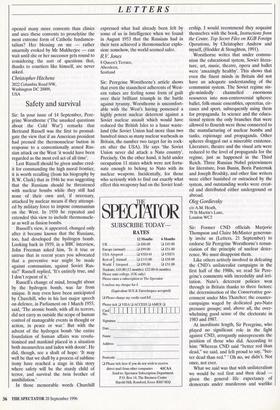Safety and survival
Sir: In your issue of 14 September, Pere- grine Worsthorne (`The unasked questions about the Cold War') remarks that Bertrand Russell was the first to promul- gate the view that if an American president had pressed the thermonuclear button in response to a conventionally armed Rus- sian attack on the West 'it would have been regarded as the most evil act of all time'.
Lest Russell should be given undue cred- it for commanding the high moral frontier, it is worth recalling (from his biography by R.W. Clark) that in 1946 he was suggesting that the Russians should be threatened with nuclear bombs while they still had none of their own and, if necessary, attacked by nuclear means if they attempt- ed by military force to impose communism on the West, In 1950 he repeated and extended this view to include thermonucle- ar as well as fission bombs.
Russell's view, it appeared, changed only after it became known that the Russians, too, had developed the hydrogen bomb. Looking back in 1959, in a BBC interview, John Freeman asked him, 'Is it true or untrue that in recent years you advocated that a preventive war might be made against communism, against Soviet Rus- sia?' Russell replied, 'It's entirely true, and I don't repent of it.'
Russell's change of mind, brought about by the hydrogen bomb, was far from unique. It may even have been anticipated by Churchill, who in his last major speech on defence, in Parliament on 1 March 1955, said, 'The atomic bomb, with all its terrors, did not carry us outside the scope of human control of manageable events in thought or action, in peace or war.' But with the advent of the hydrogen bomb 'the entire foundation of human affairs was revolu- tionised and mankind placed in a situation both measureless and laden with doom'. He did, though, see a shaft of hope: 'It may well be that we shall by a process of sublime irony have reached a stage in this story where safety will be the sturdy child of terror, and survival the twin brother of annihilation.'
In those memorable words Churchill expressed what had already been felt by some of us in Intelligence when we found in August 1953 that the Russians had in their turn achieved a thermonuclear explo- sion: somehow, the world seemed safer.
RV.. Jones
8 Queen's Terrace, Aberdeen, Scotland


















































































 Previous page
Previous page